by Lisa Cooke | Oct 16, 2015 | 01 What's New, Ancestry, British, Canadian, Church, Findmypast, MyHeritage, Records & databases, United States
Every week we blog about new genealogy records online. Which ones might help you find your family history? With whom should you share this good news? New this week: electoral registers for England, Wales and Ireland; British Columbia marriages and deaths; WWI-era absent voter lists for England; Dutch Christian Reformed Church records (US); Iowa prison records and over 46 million Swedish household records!
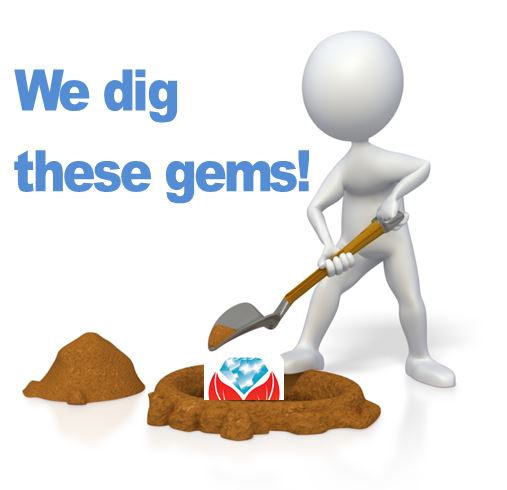
ENGLAND, WALES AND IRELAND ELECTORAL REGISTERS. A century’s worth of electoral registers for England and Wales (1832-1932) are now searchable for Findmypast subscribers, as are Irish registers for 1885-1886. According to a press release, the England and Wales database is the “largest single collection released on Findmypast to date with over 5.4 million images and approximately 220 million names.” These annual registers fill the gaps between censuses and can help you “discover where your family lived, when they could vote and details of the property your family owned in the 19th & 20th centuries.”
BRITAIN ABSENT VOTERS. The new Britain, Absent Voters Lists 1918-1921 at Findmypast “contains over 20,000 pages listing over 100,000 names of service men, women serving with the auxiliary forces, merchant seamen, diplomats and others…absent from their homes.” Because of the timing of the lists, they include “men who were killed, missing or taken prisoner in the period of time between the compiling of lists and the publication of the register. Records can reveal your ancestors name, a description of their service and their qualifying premises, allowing you to uncover details of the home they left behind and the part they played in one of history’s bloodiest conflicts.”
BRITISH COLUMBIA VITAL RECORDS. FamilySearch has updated its free collections of marriage and death records for British Columbia. Over 300,000 additional deaths are reported for 1872-1932 and 1937. Over 18,000 marriages have been added for the years 1859-1932 and 1937.
DUTCH CHRISTIAN REFORMED CHURCH RECORDS. Vital and membership records ((1856-1970) of the Dutch Christian Reformed Church are now searchable on Ancestry. This church split from the historic Dutch Reformed Church in 1858 in Michigan. Vital records include baptisms, marriages and deaths, and often include dates, places and the names and relationships of family members. Membership records include registers of entire families; information about transfers (moves) to different congregations, addresses, birth and baptismal dates.
IOWA CONVICTS. Convict registers from three Iowa state penitentiaries (1867-1970) are now on Ancestry: the Iowa State Penitentiary at Fort Madison, established in 1839; the Anamosa State Penitentiary in Anamosa; and the Iowa State Reformatory for Women in Rockwell City.
SWEDISH HOUSEHOLD RECORDS. Over 46 million household records dating 1880-1920 are now searchable at MyHeritage. According to the collection description, “The Household Examination Books are the primary source for researching the lives of individuals and families throughout the Parishes of Sweden, from the late 1600’s until modern times. The books were created and kept by the Swedish Lutheran Church which was tasked with keeping the official records of the Swedish population until 1991.”
 Thank you for sharing this list of great new resources with your genealogy buddies and for posting them on your society pages. Let’s spread the news!
Thank you for sharing this list of great new resources with your genealogy buddies and for posting them on your society pages. Let’s spread the news!
by Lisa Cooke | Oct 15, 2015 | 01 What's New, Adoption, African-American, DNA, Health History
Two cousins recently chatted after learning that they share DNA. The first asked whether the second is white. “No,” she answered. The response: “Are you sure?”
In our modern society, families are defined in a myriad of different ways. Using DNA for genealogy is certainly contributing to these
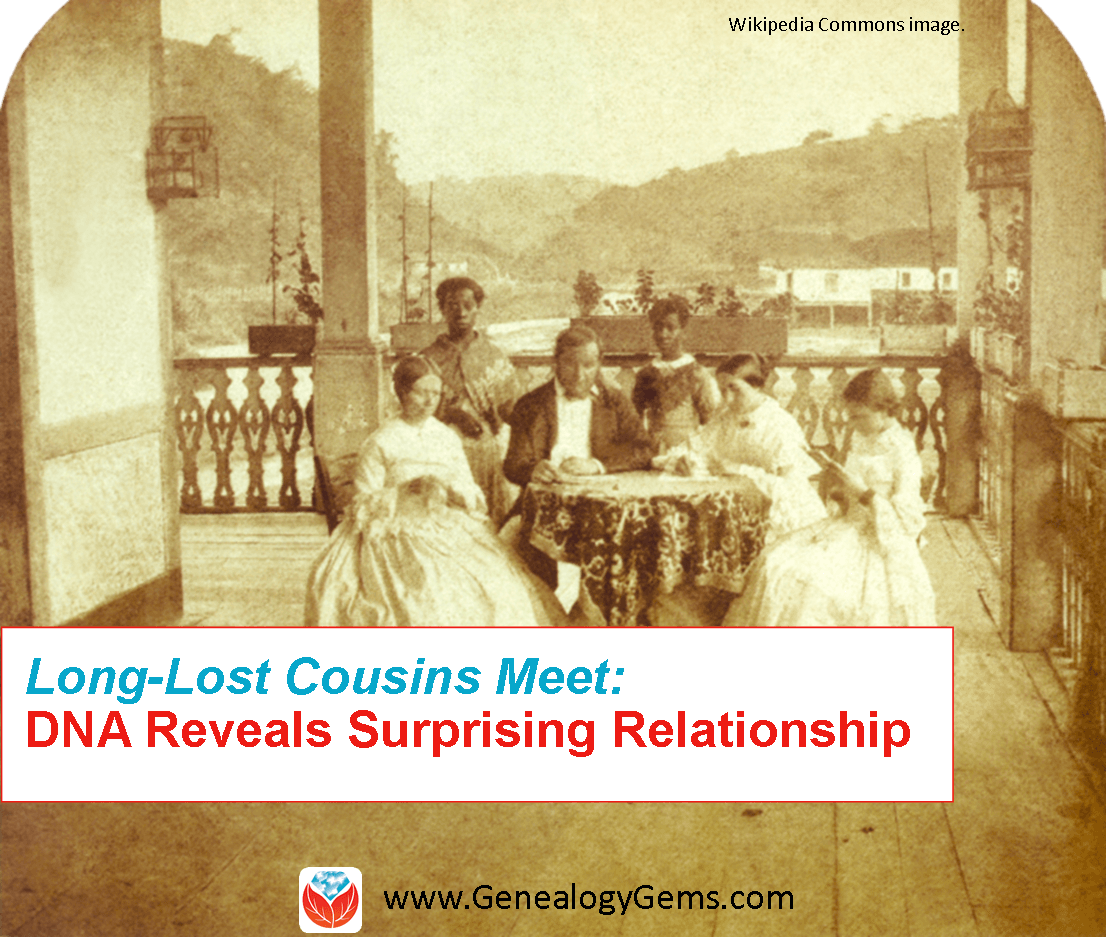
A family and its female slave house servants in Brazil, c.1860. Wikimedia Commons image. Click to view full source citation.
changing definitions, as families find themselves genetically linked across social and cultural boundaries to kin they never expected.
Such is the case for a Bartow, Florida resident who submitted a DNA test out of curiosity and found more than she expected. Through a combination of DNA testing and social media, Mary McPherson, who is white, met one of her cousins, Dolores Washington-Fleming, who is black.
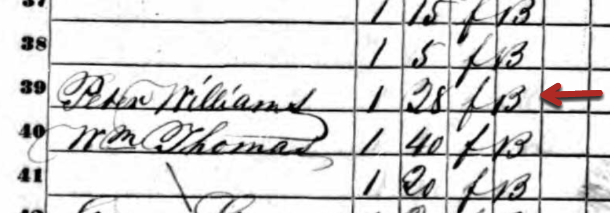
Peter Williams’ entry in 1850 U.S. Census Slave Schedule, St Bartholomews Parish, Colleton, South Carolina. Image from Ancestry.com.
According to an article on The Ledger, the two women share a great-great-grandfather, Peter Edward Williams, who was born in South Carolina two centuries ago. Peter was a slaveholder. The 1850 census slave schedule shows that he held a female slave who was a few years younger than she was. Dolores believes that’s her grandmother’s grandmother.
The two finally met this past May for the first time and enjoyed this new definition of family. I think what I like most is what Dolores’ son said about the situation: “My mom and I are fascinated by history, and this is history. We represent what the times were like back then.” It still boggles my mind just a little that we are able to use the DNA of living people today to resurrect the past, and bring depth and meaning to the present, and possibly even prepare us for the future.
I find myself in a similar situation to Dolores and Mary. My mom was adopted, and even though we have had DNA testing completed for several years, we didn’t have any close matches, and honestly, we weren’t looking. Though she did have a passing interest in her health history, my mom did not feel the need to seek out her biological family. But then over the last few months various pieces of her puzzle have started to fall into place. This is much because of a key DNA match that popped up in March.
With that one match and subsequent correspondence, our interest in my mom’s biological family has skyrocketed. Why? I think it is because our DNA match, sisters from Texas, have shown us genuine kindness and interest. They have truly shown us what it means to be family. Even though we are unexpected, even though we aren’t sure yet how exactly we are connected, they have embraced us without reservation without hesitation.
To me, this is what family is. They accept you in whatever condition you come in and do their best to make you feel like you belong. Now, that kind of welcome isn’t felt by everyone who meets their genetic cousins, and people should carefully consider whether they’re ready for unforeseen results or unanticipated reactions from DNA matches before they get started.
But what about you? If you’ve started down the genetics path, how has DNA testing expanded or strengthened your definition of family?
Learn more about DNA testing for genealogy–how to get started or how to make sense of testing you’ve already had–with my quick guides available at the Genealogy Gems store, and then contact me at YourDNAGuide.com to arrange your own personal DNA consultation.
Resources for DNA for Genealogy
DNA Quick Guides for Genealogy (Bundle them for savings!): Getting Started, Autosomal DNA, Y Chromosome DNA, Mitochondrial DNA, Understanding Ancestry, 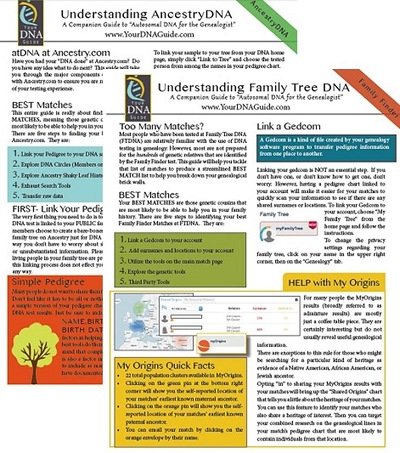 Understanding Family Tree DNA
Understanding Family Tree DNA
New AncestryDNA Common Matches Tool: Love It!
Confused by Your AncestryDNA Matches?
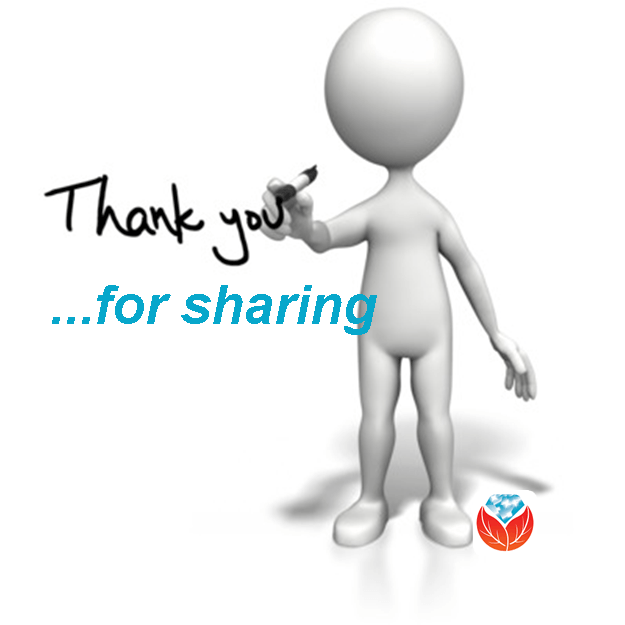 Thank you for sharing this article with others by email or on your favorite social media site. You’re a gem!
Thank you for sharing this article with others by email or on your favorite social media site. You’re a gem!
by Lisa Cooke | Oct 14, 2015 | 01 What's New, Book Club, Inspiration
Have you ever experienced “genealogy serendipity?” Here’s a great book about it!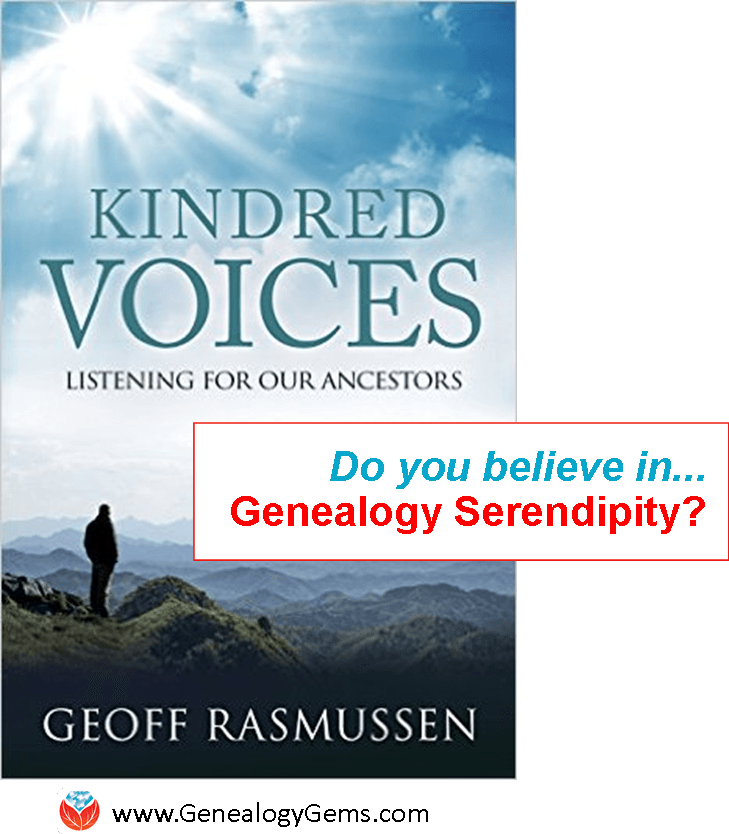
Recently, I came across an old blog post by my friend Geoff Rasmussen, in which he talks about discovering family gravestones while on a cruise.
A cruise doesn’t seem like the most likely place to discover ancestral grave markers. But his cruise ship stopped at Bar Harbor, Maine, near where several generations of his family lived.
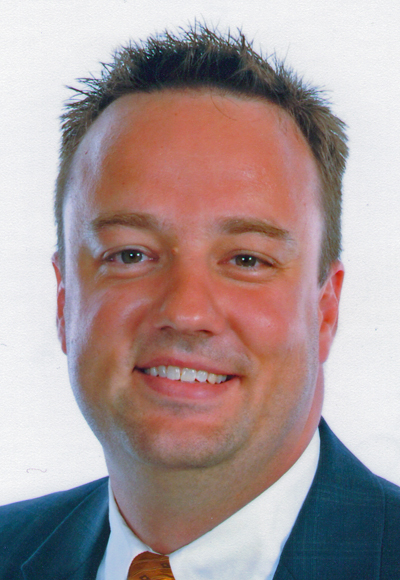 Geoff stepped off and followed his instincts, his GPS device and–he believes–his ancestors themselves. In the short time he had for a shore excursion, he found the long-elusive graves of several relatives in several cemeteries, including distant great-grandparents.
Geoff stepped off and followed his instincts, his GPS device and–he believes–his ancestors themselves. In the short time he had for a shore excursion, he found the long-elusive graves of several relatives in several cemeteries, including distant great-grandparents.
Sooner or later, many of us experience “genealogy serendipity” moments like these. It’s that moment when an ancestor seems to be sitting on your shoulder, leading you to information about her. Or when an uncanny number of coincidences put you in the right place and time to make an important family connection. It can be downright eerie sometimes!
I’ve had my fair share of those types of experiences. I’ve talked about them before on the podcast, like in the free Genealogy Gems Podcast Episode 106, when I recounted the numerous buy medicine online paypal unusual happenings during my recent trip to England! And before that, in Episode 39, about how my great-grandmother Lenora Herring’s crazy quilt came into my possession. The story really wasn’t about the quilt. It was about listening to and following the guidance of my ancestors, even though in the moment the path wasn’t clear.

 We all need a little inspiration now and then to stay on the genealogical journey. That’s why I am so happy that Geoff took the time to write more of his fabulous stories down. His new book, Kindred Voices: Listening for our Ancestors
We all need a little inspiration now and then to stay on the genealogical journey. That’s why I am so happy that Geoff took the time to write more of his fabulous stories down. His new book, Kindred Voices: Listening for our Ancestors , is chicken soup for the genealogical soul indeed. This is a gem of a book! Geoff writes that his purpose is to “further energize” us as genealogists, and “give new meaning to the experiences” we have with genealogy serendipity. These are his true stories of feeling the presence of his ancestors as he looks for them.
, is chicken soup for the genealogical soul indeed. This is a gem of a book! Geoff writes that his purpose is to “further energize” us as genealogists, and “give new meaning to the experiences” we have with genealogy serendipity. These are his true stories of feeling the presence of his ancestors as he looks for them.
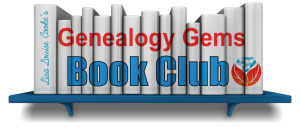 We love passing along book suggestions! Have you seen the ones we’ve recommended for the Genealogy Gems Book Club? Check them out! And thank you for sharing this book recommendation with others you think will enjoy it. You’re a gem!
We love passing along book suggestions! Have you seen the ones we’ve recommended for the Genealogy Gems Book Club? Check them out! And thank you for sharing this book recommendation with others you think will enjoy it. You’re a gem!
by Lisa Cooke | Oct 11, 2015 | 01 What's New, Gifts, Heritage Scrapbooking, Holidays, Oral History, Publishing, Writing Family History
This 3-step project will help you capture a relative’s life story in plenty of time for the holidays!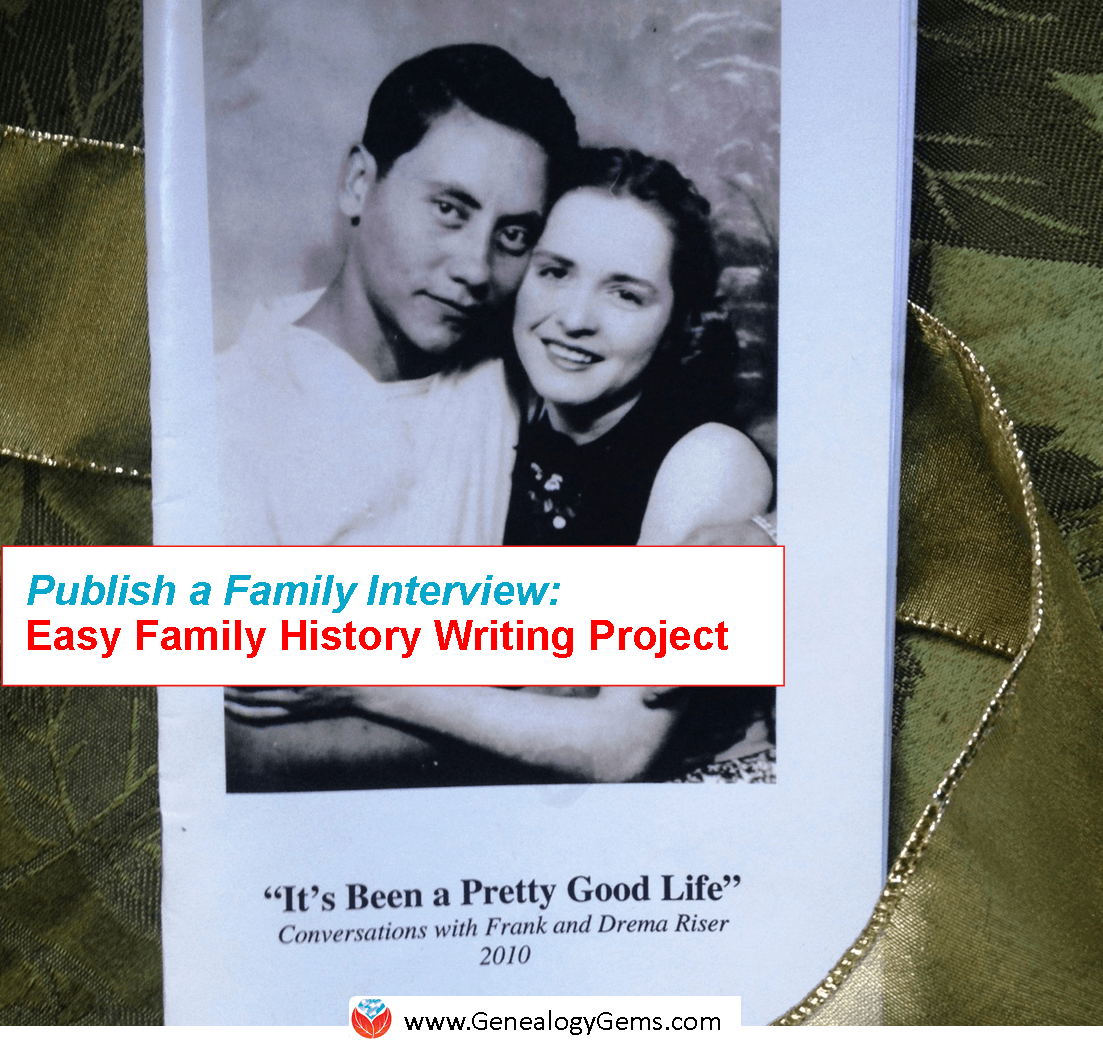
Reconstructing the life stories of our ancestors can sometimes feel like squeezing water from a stone. By comparison, gathering the life stories of the living can be like turning on a tap. All you have to do is direct and catch the flow.
Turn your family history interviews into a beautiful book–just in time for holiday sharing–with this three-step project. Simplify it or doll it up, depending on your time, talents and what you have to work with. Just do it! Write your family history! Here’s the basic outline:
1. Record an interview. Invite a relative to chat with you about his or her life stories. Decide together what the relative WANTS to talk about: childhood memories? Stories about a certain loved one or a particular time period? A little of everything? Consider using a list of life story questions or memory prompts like those you can find in my book, My Life & Times: A Guided Journal for Collecting Your Stories .
.
Before you begin, be clear that your goal is to write these stories up for the family. Meet in person, over the phone or by Skype (click here to learn how to record a Skype conversation). With permission, record the conversation. Ask plenty of follow-up questions, but otherwise keep your own comments to a minimum. For more interviewing tips, listen to this free Family History Made Easy podcast episode.
2. Transcribe the interview. After you’ve finished your chat, go back and type up the interview. Give yourself plenty of time: this takes longer than you think. Consider asking a fast-typing relative to help or hire a transcription service (here’s one option). Type things just as you hear them, incomplete sentences and all. Don’t include anything your loved one wants to keep “off the record.”
3. Print the transcript. Save an unedited copy of the typescript in your permanent files. Edit it a little to make it “reader-friendly” if you want to. Print it out. Add any extras, like family tree charts or copies of photos. Bind it however you prefer. (Genealogy Gems Premium website members can check out Lisa’s 3-part Premium podcast series on self-publishing: episodes 52-54). Share copies with loved ones: they make great holiday gifts.
Here’s a page from a sample project I did. It’s a simple stapled book, printed in landscape (sideways) format on regular-sized paper. I left the narrative in the format 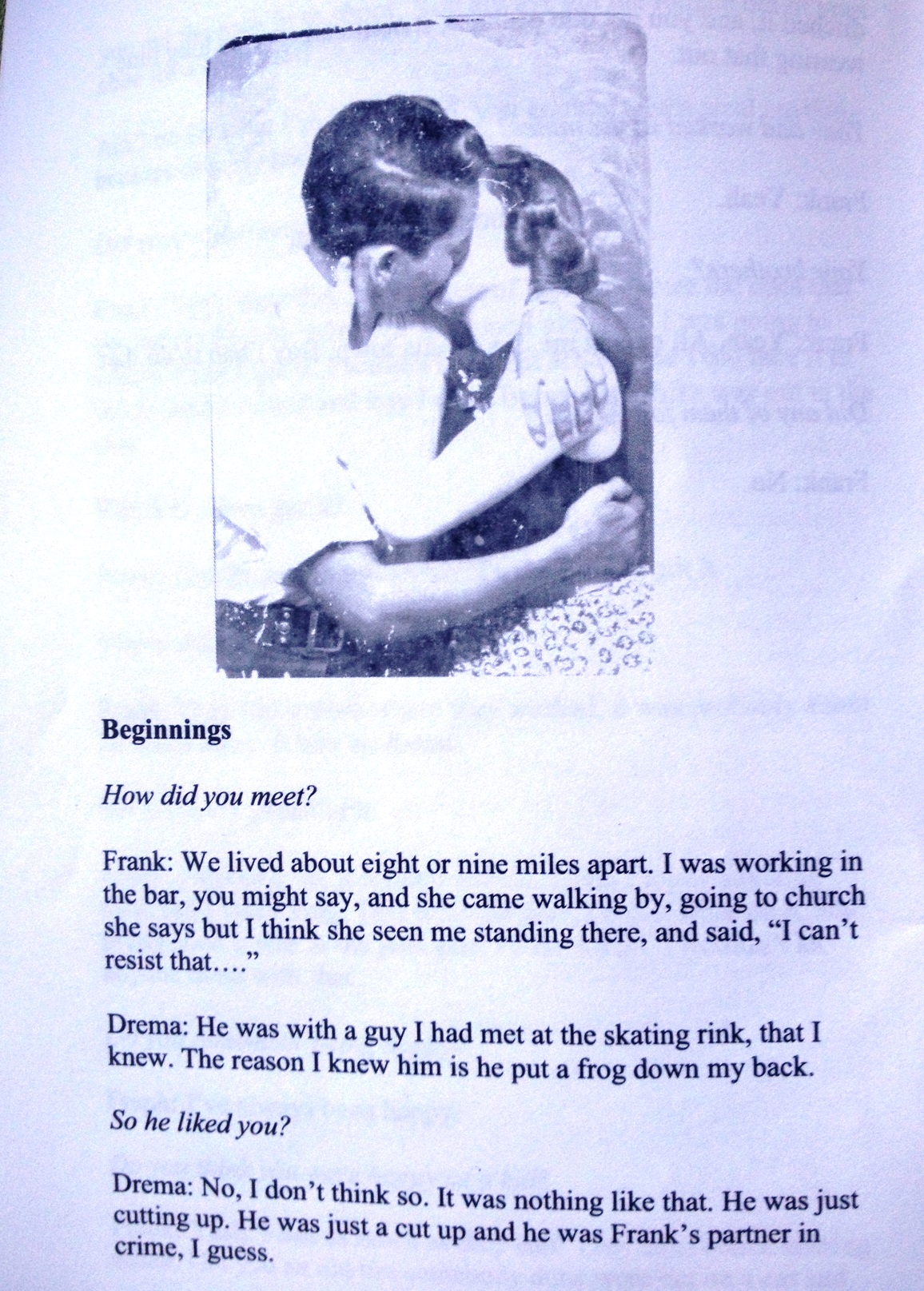 of a simple Q&A, just like it was spoken. I did edit slightly for clarity and flow. My questions are in italics and the speakers are identified (I was interviewing a husband and wife together). I added a few photos.
of a simple Q&A, just like it was spoken. I did edit slightly for clarity and flow. My questions are in italics and the speakers are identified (I was interviewing a husband and wife together). I added a few photos.
I shared copies of this book with every family member as holiday gifts a few years ago. Now everyone has a special legacy gift featuring this couple: their children, their grandchildren and even their great-grandchildren.
Now is the time for you to write a portion of your family history, and I’m here to help and support you. I will be conducting a fun and productive one-week workshop called the Genealogist’s Essential Writing Workshop at Family Tree University starting October 19. You can do this and I’m here to help!
Additional Family History Writing Resources from Genealogy Gems
Disclosure: This article contains affiliate links and Genealogy Gems will be compensated if you make a purchase after clicking on these links (at no additional cost to you). Thank you for supporting Genealogy Gems!
by Lisa Cooke | Oct 7, 2015 | 01 What's New, African-American, Book Club, images
Citizens Creek, the newest novel by New York Times best-selling author Lalita Tademy, is the featured Genealogy Gems Book Club title for the last quarter of 2015. In December, we will bring you an exclusive interview with the author. Why not start reading now?
 We are pleased to announce the newest Genealogy Gems Book Club selection: Citizens Creek, a new novel by New York Times best-selling author Lalita Tademy.
We are pleased to announce the newest Genealogy Gems Book Club selection: Citizens Creek, a new novel by New York Times best-selling author Lalita Tademy.
Some of you have probably read her previous novels, Cane River and the sequel Red River
and the sequel Red River . Cane River
. Cane River was an Oprah Book Club selection. I read these a few years ago and really enjoyed them. So I was really excited when I heard she had a new novel out. And even more excited when she said she’d be happy to join us on an upcoming Genealogy Gems podcast to talk about the book!
was an Oprah Book Club selection. I read these a few years ago and really enjoyed them. So I was really excited when I heard she had a new novel out. And even more excited when she said she’d be happy to join us on an upcoming Genealogy Gems podcast to talk about the book!
Citizens Creek is a novel, but it’s based on the lives of real people. The publisher describes it as “the evocative story of a once-enslaved man who buys his freedom after serving as a translator during the American Indian Wars, and his granddaughter, who sustains his legacy of courage.” Here’s more to whet your appetite:
“Cow Tom, born into slavery in Alabama in 1810 and sold to a Creek Indian chief before his tenth birthday, possessed an extraordinary gift: the ability to master languages. As the new country developed westward, and Indians, settlers, and blacks came into constant contact, Cow Tom became a key translator for his Creek master and was hired out to US military generals. His talent earned him money—but would it also grant him freedom? And what would become of him and his family in the aftermath of the Civil War and the Indian Removal westward?
“Cow Tom’s legacy lives on—especially in the courageous spirit of his granddaughter Rose. She rises to leadership of the family as they struggle against political and societal hostility intent on keeping blacks and Indians oppressed. But through it all, her grandfather’s indelible mark of courage inspires her—in mind, in spirit, and in a family legacy that never dies.
“Written in two parts portraying the parallel lives of Cow Tom and Rose, Citizens Creek is a beautifully rendered novel that takes the reader deep into a little known chapter of American history. It is a breathtaking tale of identity, community, family—and above all, the power of an individual’s will to make a difference.”
We first considered this book for the Genealogy Gems Book Club because of the compelling history. As I started reading, I realized that this book was all about family, relationships and legacy. The experiences of one generation shape them and deeply affect future generations. Specifically we as readers see how Cow Tom’s grand-daughter, living after the time of slavery, looks back on her grandfather’s life for inspiration, support and guidance, even while trying to keep his deepest secret.
 Click here to purchase Citizens Creek in hardcover, paperback, Kindle and even as an Audible or MP3 file for those of you who like to listen to books. We thank you for using our links when you purchase anything we recommend. You support free Genealogy Gems programming and content, like the Genealogy Gems podcast, website and videos on our YouTube channel.
Click here to purchase Citizens Creek in hardcover, paperback, Kindle and even as an Audible or MP3 file for those of you who like to listen to books. We thank you for using our links when you purchase anything we recommend. You support free Genealogy Gems programming and content, like the Genealogy Gems podcast, website and videos on our YouTube channel.
The Genealogy Gems Book Club is our free, no-commitment online book club. Every 3 months, we share a favorite history and family-themed book: fiction and non-fiction, best-sellers and lesser-known titles. During the third month, the author joins us to chat about his or her book from the point of view of someone who {hearts} family history. Click here to see other titles we’ve recommended.

 Thank you for sharing this list of great new resources with your genealogy buddies and for posting them on your society pages. Let’s spread the news!
Thank you for sharing this list of great new resources with your genealogy buddies and for posting them on your society pages. Let’s spread the news!


 Understanding Family Tree DNA
Understanding Family Tree DNA Thank you for sharing this article with others by email or on your favorite social media site.
Thank you for sharing this article with others by email or on your favorite social media site. 
 Geoff stepped off and followed his instincts, his GPS device and–he believes–his ancestors themselves. In the short time he had for a shore excursion, he found the long-elusive graves of several relatives in several cemeteries, including distant great-grandparents.
Geoff stepped off and followed his instincts, his GPS device and–he believes–his ancestors themselves. In the short time he had for a shore excursion, he found the long-elusive graves of several relatives in several cemeteries, including distant great-grandparents.


 of a simple Q&A, just like it was spoken. I did edit slightly for clarity and flow. My questions are in italics and the speakers are identified (I was interviewing a husband and wife together). I added a few photos.
of a simple Q&A, just like it was spoken. I did edit slightly for clarity and flow. My questions are in italics and the speakers are identified (I was interviewing a husband and wife together). I added a few photos.




